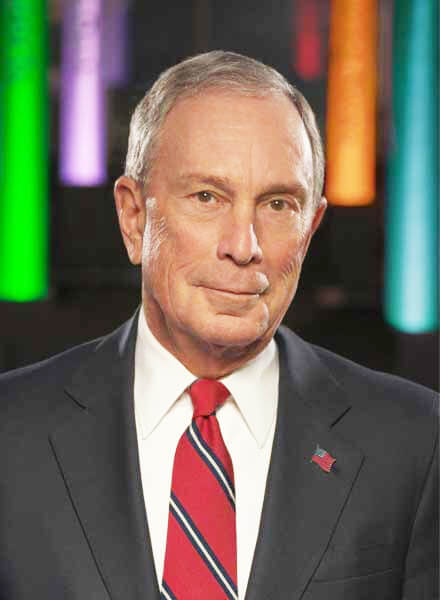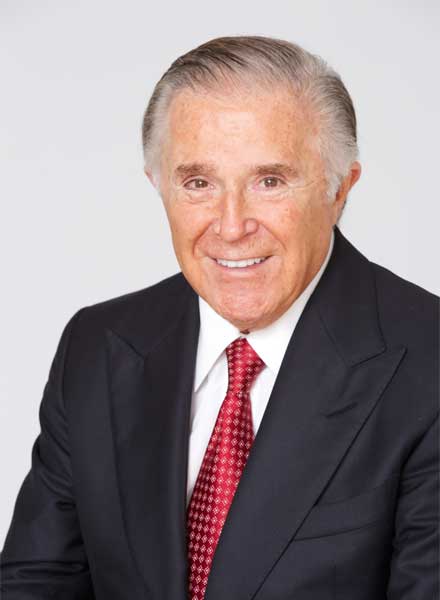Meet Our Donors
Bloomberg~Kimmel Institute for Cancer Immunotherapy founded with $125 million in gifts
In March 2016, Johns Hopkins answered the call set forth by former Vice President Biden’s “Moonshot Initiative” to cure cancer, by establishing the Bloomberg~Kimmel Institute for Cancer Immunotherapy.
At this critical time, when the Kimmel Cancer Center’s discoveries in immunotherapies are having unprecedented success, two Johns Hopkins champions have once more stepped up to the challenge and are providing essential funding to help ensure we realize the full potential of the immune system’s ability to fight cancer.
Sidney Kimmel, who helped lay the foundation for the Sidney Kimmel Comprehensive Cancer Center, and leading Johns Hopkins supporter, three-term mayor of New York and philanthropist, Michael R. Bloomberg, are each contributing $50 million over five years. More than a dozen additional supporters are contributing an additional $25 million.
Learn more about the Bloomberg~Kimmel Institute for Cancer Immunotherapy.
Become a Johns Hopkins champion. Make a gift to support immunotherapy research.

Michael Bloomberg
A self-proclaimed average high school student, Michael Bloomberg credits Johns Hopkins with sparking his interest in leadership and governance. He was president of his senior class and his fraternity, graduating in 1964 with a degree in engineering. His gratitude toward his alma mater started with a $5 gift made the following year.
When that $5 is added to all of the contributions the philanthropist, entrepreneur, and three-term New York City Mayor has since made to Johns Hopkins, it totals more than $1.5 billion—an amount believed to be the most by any living donor to an educational institution. Johns Hopkins University President Ronald Daniels calls his philanthropy “transformational.” It has aided scholars and scientists throughout Johns Hopkins and expanded collaboration across disciplines—a trademark of Johns Hopkins.
“Each dollar I have given to Johns Hopkins has been well-spent improving the institution and, just as importantly, making its education available to students who might otherwise not be able to afford it,” says Bloomberg, who served as Chairman of the University Board of Trustees from 1996-2002. “Giving is only meaningful if the money will make a difference in people’s lives, and I know of no other institution that can make a bigger difference in lives around the world through its groundbreaking research,” says Bloomberg.
Philanthropic gifts to Johns Hopkins
- $1 million gift established the Charlotte R. Bloomberg Professorship in the Humanities in the University’s Krieger School of Arts and Sciences.
- The School of Public Health renamed in honor of Bloomberg’s generosity, including a $125 million gift to establish the Bloomberg School of Public Health’s Malaria Research Institute.
- The 12-story, 560,000-square-foot Charlotte R. Bloomberg Children’s Center opened, made possible through a $120 million gift.
- A $350 million contribution was made to recruit 50 faculty members as Bloomberg Distinguished Professors and support undergraduate financial aid.
- A $50 million gift helped establish the Bloomberg~Kimmel Institute for Cancer Immunotherapy to realize the promise of immune-based therapies to fight cancer.

Sidney Kimmel
Sidney Kimmel was a child of the Depression era. His father, who had been a musician in a society band prior to the economic collapse, was unemployed for several years before taking a job as a cab driver. The family counted on quarters, dimes and nickels he received in tips. One day, however, his father received a $50 tip. His father gave $25 to a fellow cab driver who was struggling to support three children.
Kimmel suspects that’s when his desire to give was born. “His good heart and generosity inspired me,” says Kimmel. “At a time when his own family was desperate to put food on the table, he made the choice to give half of what he had away.”
His motivation to work hard and earn a living to help his family led Kimmel, by chance, to the women’s apparel industry. His dream was to have his own company, and in 1970, he started Jones New York and grew it to a multibillion-dollar business.
“I was never a dreamer. I was a doer,” says Kimmel, who also began producing films in 1984. “I was 61 before I became wealthy, and I learned the more money you make, the more money you can give away.”
Kimmel has contributed more than $850 million to various causes, including the arts, education, and health and medicine, particularly cancer research and care. In 1998, he was the lead sponsor of The March: Coming Together to Conquer Cancer which helped capture an additional $400 million in government funding for cancer research. Three years later, he made a landmark gift to Johns Hopkins for cancer research and patient care, and the Sidney Kimmel Comprehensive Cancer Center was named in his honor.
“It takes more than dedicated researchers to make progress against cancer,” says Kimmel. “It also takes money.” He made his commitment to Johns Hopkins because, he says, “They are the best.”
“I think we all have a certain responsibility in life,” says Kimmel. “Mine is to help others.”
Philanthropic gifts to Johns Hopkins
- A $150 million landmark gift supported cancer research and patient care at Johns Hopkins—it is the largest single gift to the Cancer Center.
- Provided lead funding for the Hackerman-Patz Patient and Family Pavilion, a residence for patients and families undergoing prolonged treatments.
- Over the past two decades, Johns Hopkins researchers have received 12 Kimmel Scholar Awards—a $200,000 stipend given to “out of the box” thinkers launching their careers.
- A $50 million gift helped establish the Bloomberg~Kimmel Institute for Cancer Immunotherapy to realize the promise of immune-based therapies to fight cancer.
